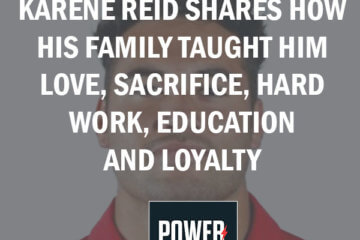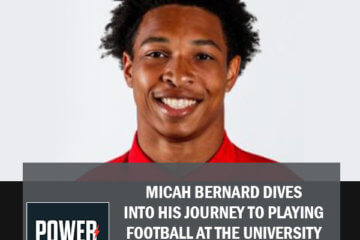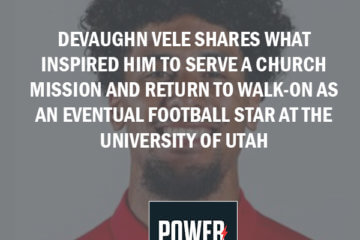Listen to the podcast here
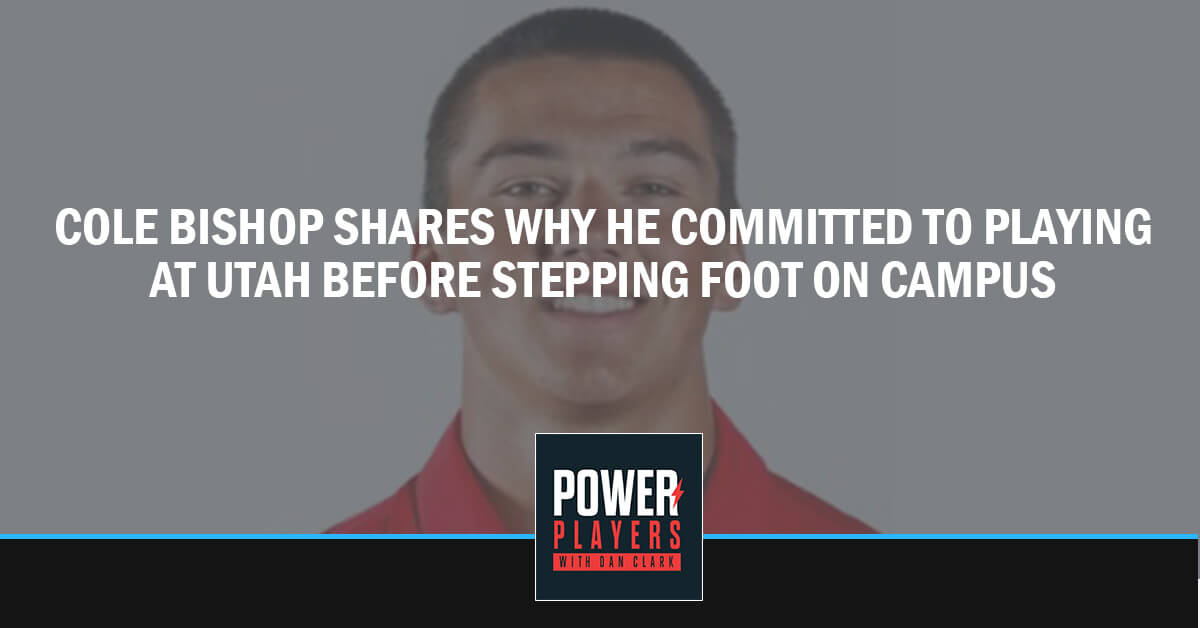
Sports are more than just a game—it has a powerful and almost personal impact on the team, the audience, and the players themselves. In this episode, special guest Cole Bishop joins host Dan Clark as he shares his sports journey and what got him committed to playing football at the University of Utah as a junior in high school before stepping foot on campus. Full of team strategies, mindset lessons, and heartwarming moments, tune in to this conversation to hear Cole’s story on playing for Utah and understand how sports is truly more than just a game!
—
Cole Bishop Shares Why He Committed To Playing At Utah Before Stepping Foot On Campus
This is an interview with University of Utah Football star Cole Bishop. Thank you so much for spending some time with me. In this episode, the superstar sophomore safety, who started lacrosse and football at Starr’s Mill High School in Georgia, who is all-region and all-county as a sophomore, first-team all-state as a junior, County and Region MVP, and invited to play in the Blue-Gray All-American Bowl, and who happens to love wakeboarding, snowboarding, and golfing in the off-season shares why he committed to playing at the University of Utah in his junior year in high school without even taking a recruiting trip to visit Utah.
He’s giving us an inside glimpse into what it takes to become a starter as a true freshman on the Pac-12 championship team, earning All-Conference honorable mention his freshman year, playing an elite level every game on every play, leading all Pac-12 secondary players, and averaging 5.8 tackles per game.
—
Welcome to the show.
Thank you for having me. I’m glad to be here.
There are some gentlemen in our world who are handsome. There are those few select men who are pretty. I didn’t know I was going to be interviewing an Abercrombie model. We have to get some NIL money going if nothing else from a modeling agency. Cole Bishop, you grew up in Georgia. Were you born in Massachusetts and grew up in Georgia? That’s why you love lacrosse because that’s a Northeastern sport more popular than football. Take us back to your youth.
I was born in Massachusetts in the Boston area. I lived there until I was about two. My family grew up there their whole lives. We’re big Patriots, Red Sox, and Bruins fans. When I was about two, we moved to Georgia. I have pretty much lived there my whole life. Since then, I started playing football when I was about five years old. I’ve been playing my whole life. A few years later, I ended up picking up lacrosse honestly because one of my friends played. I ended up playing that. I took football so seriously. That was more for fun and having a good time but I got pretty good at it. I liked playing that a lot.
I had a good friend who went to a rival university here. I was playing football and baseball at the University of Utah. He was playing lacrosse. I’ve never seen it. I went to a practice that gave me one of those little net stick deals that you catch the ball with. I could catch it but to run with it and then throw it with accuracy takes a lot of talent. When I was out there, I had one of the more brutal collisions in my life as a contact sport athlete. Lacrosse is no sissy game. The footwork, the eye-hand coordination, and the strategies had to play into becoming one of the elite defensive backs in the Pac-12.
In the off-season, being able to keep playing another sport that allows you similar to Gardner, a receiver in some cases, staying with them, trying to stay square, and then being able to do that when I’m not playing football helped me.
What advice would you give to parents when most high school, college, or even middle school coaches want athletes to segregate themselves away from any other sport and focus on one sport? There’s the one-sport athlete. You played both ways. I’m old enough to have played both ways. Teach us about what you mentioned briefly about lacrosse and opportunities for coaches who are recruiting to see you in other sports so they can see your agility as a defensive back.
You’ve got to be able to go as fast left and right as you do North and South. Maybe that’s where you started to perfect your skills. Some of the greatest receivers that I ever coached in high school played Little League soccer at the highest level. They were like cats. Their balance was a little different than most who only played football. What would you recommend?
Having another sport whether that’s 1 or 2 regardless of what it is helps out even for the aspect of having fun too. You only get to play it once so you might as well play as many sports as you can. In my junior year, I almost quit lacrosse because I was trying to focus on football. I was trying to go to camps and get as many offers as I could to make the decision I wanted to but my coach ended up convincing me to play. I was happy I did. Unfortunately, it got cut out because of COVID but it helped me in the football aspect because you’re not getting so stiff in the regular movements that you only do in football. You can’t stay as fluid if all you do is one position your whole life.
I remember going from football to basketball. I was in great shape for football and lousy shape for basketball. It used completely different parts of my body. I guess you too.
That’s exactly how happened. When we would get done with football season, we would go straight into lacrosse. I would be dying right away because you’re running back and forth without the breaks.
Tell us about growing up. Was your dad a football player? Were your parents athletic? Did they support you and encourage you? Did you find it yourself by yourself?
My dad didn’t play football but he is a huge football fan. He encouraged it for as long as I can remember. Even when I was a kid, he was always trying to get me to do extra work and stuff. At the time, I wasn’t the biggest fan of it. Even toward the end of high school, it would get annoying sometimes but looking back, it helped me the most being able to get better at certain things that I wouldn’t necessarily do by myself.
Did your family encourage you to be a student-athlete or a focused athlete? Were they emphasizing education? You’re so smart and articulate. I honor you. Talk to us about the influence of your family, your parents, and your brother had on your athletic and student-athletic career.
They wanted me to take school seriously. I had pretty good grades in high school. I had all As and Bs for the most part. I was committed to Duke at one point in high school. A big part of that was the academics. They weren’t the best football team but a big part of my recruitment was trying to go to a school where I can get a good degree because you never know what happens after football.
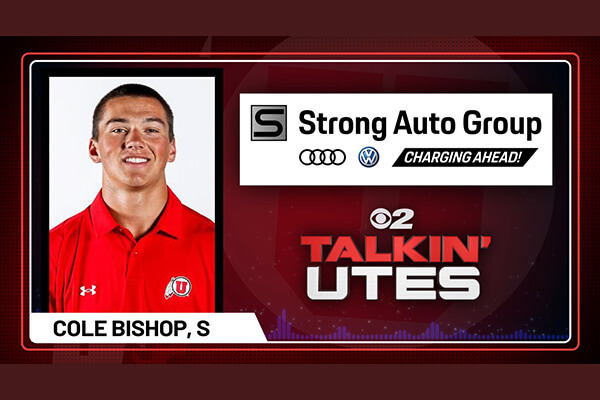
Cole Bishop: A big part of my recruitment was just trying to go to a school where I could get a good degree because you never know what happens after football; you never know how far you can go with it.
You never know how far you can go with it but the more I looked at it, I wanted to take football as seriously as I could but I still did take school seriously. My brother graduated from Georgia Tech. He didn’t play football. He was a student. He majored in Industrial Engineering. He was smart. They always tried to push me to be smart like him in the classroom.
When you grew up in Georgia, did you suddenly become an Atlanta Braves fan and Atlanta Hawks fan?
Unfortunately, no. Pretty much all my friends are Hawks, Braves, and Falcons fans. It was one of the best times. I was in middle school maybe when the Patriots beat them and when the Falcons came back. It might have been early high school but I remember they were all excited because they were beating us, and then we ended up coming back. That was awesome.
Growing up, who did you idolize as an athlete?
I liked Rodney Harrison. He was a safety for the Patriots. He was a physical player.
He ended up playing safety for the Falcons too, didn’t he?
I did not know that.
In the Super Bowl, he did.
Another guy is Eric Weddle. I had no idea he had any connection to Utah at all. I found out he went to Utah. When I got here, I didn’t even know about it but I always loved watching him. We have some similar attributes in the game. It’s cool getting to see that and then seeing people online sometimes comparing me to him and everything. It’s pretty awesome.
It is number eight. Take us back to high school. You were an extraordinary athlete in your sophomore and junior year. COVID hit and it fizzled all opportunities for competitive events. Tell us about your junior year, which was extraordinary. You were all-world. There are people on Mars still cheering you on. You were amazing.
I did all right in my freshman year. I got to start on varsity as a freshman. That was awesome but I wasn’t making a ton of plays. It was more of trying not to mess up. In sophomore year, I didn’t do great still. Junior is the biggest jump in my performance. I felt like I was able to turn into a leader on the field and be able to make plays as often as I could. In the middle of the playoffs, I got my first offer in my junior year. They all started to get a few more after that. I played lacrosse that next semester going into it. In my senior year, I did get a football season but no lacrosse because I early enrolled. I was set on Utah at that point. It was in the middle of the season.
I read up on it. You committed and didn’t even make a visit to Utah. Tell us about the reputation of the Utes. Why did you choose Utah all the way from Georgia?
Coach Scalley reached out to me one day. This was why I was committed to Duke at the time. I wasn’t completely set on Duke. It was more because COVID was happening. It was a good spot to commit. I knew I liked the coaches there but I wasn’t 100% set at the time. I wanted to make sure if anything did happen with COVID. You never know.
No one knew what was going to happen with scholarship numbers and everything like that. I knew I had a spot but once Coach Scalley reached out to me, I didn’t even know about Utah Football at all. He sent me some graphics and everything. Once we started talking, he was showing the amount of NFL talent they produce at the safety position and their history of Utah in general. The coaches and the family aspect of it helped me make my decision.
I hear it time and time again every time I interview one of you. It’s the continuity of coaches. It’s not hopscotched. It’s not a new coach this year and next year. The family matters. The friendships and relationships go deep. Whittingham and Scalley are famous for taking you under their wing as a son, not just as a player. You become part of the family. Do you have friends on other teams with whom you could compare the culture of Utah football to other teams? Tell us about that.
There are a lot of guys who have transferred from places. Most of them say that during recruitment, everyone tells you that it’s like a family. I was committed to Duke. The day I got to Utah, the guy who would have coached me at Duke left. My coach wasn’t there anymore. Cutcliffe was gone. Looking back, I’m so glad I did make this decision because the guys I built relationships with, Coach Scalley, Coach Whittingham, and all those guys are still here. Whittingham was Coach Scalley’s safety coach and so on. Almost all the defense coaches played at Utah, they all have so much family here. They love it here. They care about us and aren’t going to leave anytime soon, hopefully.
Does Coach Whit ever talk about him being an all-conference middle linebacker at BYU?
I didn’t even know that he went to BYU until the middle of 2021. Someone mentioned it. I thought that was crazy. I got the whole story of how he ended up coming here. He will mention it every now and then. At the beginning of the year, someone did a presentation on all the coaches and where they played. It was funny. They were putting up pictures of them in college. You needed to guess who it was. No one guessed Whittingham. I was surprised.
He was good. I remember watching him. He was intense with his dad, Fred, an old Raider. The football culture that comes into our coaching staff from their families is pretty impressive. Morgan Scalley was a great player here as well. Where do you link your decision to be a defensive back, choosing the most stressful position on the entire team when you could be a receiver or a running back? You had a great experience and great stats in high school. You decided to go out there and play one of the center field positions. Did you ever play corner first to get a feel for what man coverage is? Have you always been a safety?
I didn’t even run any man coverage that much until I got here. In high school, we were pretty much based out of Cover 2 teams. Coming here, it was new to me. I wasn’t great at it at first. I still got a lot of work to do but I’ve gotten a lot better.
Cover 3 is where the safety is. On the ten-yard line, he’s not even on the game field. They stick the center fielder so far back. There’s no one that can get past you.
It was different when I first got here but deciding to play safety started when I was in eighth grade. I played running back my whole life when I was a kid and linebacker or safety to be as close to the ball as you could be. When I got to middle school, I played a little bit of safety and running back. I knew that I was too small to play linebacker, running back, or anything in my freshman year, and I wanted to start as a freshman. I focused on my footwork and my knowledge of the defense. I’m trying to learn it.
I got to play safety in my freshman year and then fell in love with it. I played a little bit of linebacker in my sophomore year of high school. It wasn’t my favorite thing but once I ended up going back to safety, I started falling in love with the game again because it’s such a good mix. You’re not in the box every play and not able to run around necessarily. At safety, you can see everything before the play. You see what’s going on. You’re in past coverage and making tackles. It’s a blast. You get to do it all.
I’m a student of football. I’ve played a few positions. I watch you a lot. You’re one of the better open-field tacklers in the whole Pac-12. When it’s you mano a mano, every time you’ve come up with the hit, do you attribute that to being a linebacker for a short time? It’s more of head and shoulders, getting down, and facing the ball carrier to make that form tackle versus flying all over the field as a safety. Sometimes you are famous for going for the legs or waiting for them to catch up to you and then horse-collaring them down with the stereotype tackles of the DBs but you refuse to do that. You bring it every play. Where did you learn that? How did you subscribe to being more of a linebacker mindset when you’re playing safety?
Honestly, Coach Scalley helps out. Coming in, I was never scared to tackle my whole life. The technique is such a big part of it. Even if you’re not scared if I run full speed at someone, they can make one move, and I’ll fall. Coach Scalley is teaching us to track the near hip and try to break down before they do. That way, you can have time to make the decision on which part you’re going to go to. He always teaches us to shoot for the near hip and then try to wrap their far leg violently because if their legs are tied up, they can’t move. Coach Scalley and them teaching us the technique and practicing it pretty much every day of the season helps out.
You said you went to some camps when you were in high school. Did you go to a receiver camp to help you become a better DB? Did you go to a DB camp to help you become a better receiver so you know the difference in the mindset?
I was going as a DB. It helped me as a receiver but that wasn’t the thought process behind it. I didn’t play a ton as a receiver in high school. It was more that I would go in every now and then guarding other people. The better people you guarded, the more you would see their moves. That helped us here. Coach Scalley always says, “The better receiver you are will help us become better DBs because when we practice against each other if we’re all not good receivers, then we’re not getting any better when we’re trying to guard each other.” That helps out learning from other people and seeing their releases.
The better receiver you are, the better it will help the team become better. Click To TweetWhen you prepare for a game, what do you look for when you’re watching game films? What do you watch? Do you isolate the specific receivers? When you prepare, you look at the tendencies and the formations you see, “Most likely, they’re going to throw it here and run a screen there.” What do you do individually to remember that when this player number so-and-so lines up, you’ve got them? How do you prepare?
Tendencies are a lot of it. Depending on the week, sometimes you can find anything like a lineman’s heel being up. You can see that’s a pass. That works every time. Mostly, I’m guarding the tight end. Watching their technique, trying to see their stance necessarily when they’re lined up and their demeanor if they’re going to run a route, pass block, or run block. Being able to see certain formations help too. There are higher tendencies of what route they’re going to run. If my guy is lined up outside the hashes, he’s way more likely to come in than if he’s inside. Things like that help pick your leverage.
You get that competitive advantage based on your preparation. In your two-year career, you have an honorable mention in All-Pac-12 as a freshman. Who’s the best receiver you’ve faced so far? Who’s the most challenging?
I played against the guy from Ohio State in 2021 because of his stat line. It’s Jaxon Smith-Njigba. He had a ton of stats, unfortunately. I was coming off an injury against USC in 2021 so I didn’t play at all but I was at the game watching Drake London. He was pretty legit. Once we had Clark Phillips guard him, that started to shut him down a little bit but he’s some of the best, even guys like Devaughn Vele. Watching him practice every day is awesome. He’s great.
That’s good. You learn from your own players. Let’s talk about your pre-game preparation. Do you eat anything special? Do you listen to any favorite music? What do you do the night before a game? If it’s a noon game, it changes everything versus a night game. Tell us what you do mentally and physically.
Usually, a few of us, Coach Scalley, a few of the other coaches like Coach Shah and Coach Swan, and then a few of the players will watch films the night before. We will watch a game. Coach Scalley will go over the calls he is probably going to call. Being able to visualize yourself making the plays makes it so much easier at the game. Imagine yourself making that interception or that tackle. When it gets there, you’ve already pictured it 100 times. After you watch the games and everything, I’m going up to bed. Imagine yourself making plays. Mental imagery helps. Coach Whit harps it a lot. I see an advantage with it for sure.
Is there any music you listen to? Michael Phelps, the swimmer, was famous for jamming at the edge of the pool with his headphones on before he dove in and broke a world record. He was into rap or hard metal.
It depends on how I’m feeling. Sometimes you need to get more amped up so you listen to some rap type of music. Sometimes in bigger games when I’m already pretty amped, I’ll listen to more calm music to keep myself cool and not get too excited for the game. I keep thinking about my job and staying calm.
Clark Phillips says he listens to gospel music. I said, “You look around the locker room trying to figure out who you can save before halftime.”
That’s funny.
You pick it depending on how you’re feeling.
In most games, it’s more calm music. I rarely need to get amped up. The games get me pretty excited regardless. I like country music. I listen to that type and some calm music to keep my mind on the game and not get too focused on everything.

Cole Bishop: Calm music helps keep your mind on the game and not get too focused on everything, especially when you get too excited.
I’ve written some country hits. If I Had I Shot You When I First Met You, I’d Be Out of Jail By Now is one of my favorites. My Wife Ran Off With My Best Friend, And I’m Going to Miss Him Dearly. Do you listen to any of my songs? In junior prom, she inspired How Can I Miss You If You Won’t Go Away. Maybe we should get some of those tunes on your playlist. What’s your favorite food? Everybody wants to know.
Probably steak. I love it. My parents used to always make it whenever I was home. My least favorite thing about myself is I’m a picky eater. I try to stick to pretty basic food.
You go out with the boys, and they say, “Let’s get sushi.” You sit in the corner and drink your water.
They’ve got something there that I would like. Usually, they have some steak at those places or something.
In Georgia, they call sushi bait. How do you equate your balance of student and athlete to picturing yourself five years down the road? You said you never know what happens with football but you’re good enough to play on Sunday and go on the draft. What will your life look like when football is over? Have you ever started thinking about those things?
The goal is to play as long as I can. Depending on how long you play depends on what you do. My dream would always be to play as long as I could and then end up coaching at some point depending on how long I played, whether that’s high school or college. I want to stay around the game or get into the business world. It all depends on how long football goes.
What are you majoring in school?
Communications.
What do you hope to do with that?
It will help me get better at communicating, be able to work on my people skills, and do good at whatever job comes.
Get better, communicate, work on your people skills, and really do good at whatever job comes. It really helps. Click To TweetWarren Buffett said, “You can increase your value in the marketplace by 50% by becoming a great communicator.” You’re on the right track. If you were going to be interviewed and we were going to use your interview for recruiting other young men out there in the country to come to Utah, what would your major reasons be for encouraging someone to come?
Especially on the defensive side of the ball, it’s hard not to come, seeing all the statistics of how many guys went to the NFL. I’m pretty sure in the 2019 defense, every single player either is in the NFL or was in the NFL at some point. It’s seeing stats like that, especially the safety position. There have been so many guys in the past few years who got drafted or picked up overall. If that’s your goal in the NFL and you play defense, this is a good spot for you.
Talk to us a little bit about NIL because the dilemma is not recruiting 3-star, 4-star, or 5-star athletes but Utah is famous for recruiting 3-star athletes and turning them into 5-star. Not only are we faced with trying to convince these young men and their families. I say, “Go after the mom. You recruit the kid and retain the mom.” If we can get them involved in the conversation, we need to go head-to-head with Alabama, the USC, and the sugar daddy now in Arizona.
What will be the reason why we can retain superstar athletes like you? Teach us about the Utah culture coming from Georgia and the emphasis on family, community, education, and support. About 93% of college athletes stay in the communities where they played NCAA sports. You get a chance to meet the movers and shakers and showcase what a gentleman you are, how classy you are, your commitment to sophisticated elegance, and polished professionalism.
What would you say to a young man and his family on tape to get them to say, “Alabama is dangling this sugar daddy but you should come to Utah even if we’re not going to pay you $19 billion and driving a Ferrari on day one.” Why should they come to Utah? There’s so much more than, “Come for money. Leave for money.” We need loyalty, love of the game, and pride where you hang that shingle once you graduate, “My alma mater is the University of Utah.” That has played into it.
The coaches do a great job of explaining the family aspect of it and how important that is. If you go to another place and they pay you a lot of money doesn’t mean that they care about you or you’re going to play there. It doesn’t mean you’re going to start right away. Utah doesn’t promise that to anybody. It’s the family aspect and having coaches who care about you and call and check up on you. You can have the money but if you hate football or you’re playing and you’re not having a good time, then you’re not going to like your experience. Everyone I know likes the coaching staff. All my teammates are my brothers now. Being able to have that family aspect helps out.
We all want playing time. After you sign your first rookie contract in the NFL, we know what that bare-bones contract is like. You need playing time to get your second contract where you make big money. What would you say to an athlete at the University of Utah who’s not getting as much playing time as he thought he was going to get? Does he enter the transfer portal, take his ball, and go home? Is the community or the culture more important than playing time and money? You come for money. You leave for money. We need loyalty. Teach us about that.
The coaches are honest with the players. If you come in and you’re not performing, and they don’t suspect you would ever perform well enough, then they will probably let you know that they don’t think you’re ever going to play here. Some people might think that it’s a bad thing but that’s awesome because if you’re sitting there waiting for your turn and the coaches are always saying, “It’s coming. You’re going to be playing soon,” then you’re always waiting. It never comes. It sucks but if you have trust in the staff, that helps.
In 2019, I was told Terrell Burgess didn’t start a game until his senior year. That’s wild. People have such different careers. I got fortunate enough to start as a freshman. I’m so thankful for that. Even for guys like RJ Hubert, the other safety with me, 2022 is his first year starting. It’s the main starter because of injuries and everything. Sticking in the program and trusting the coaches to develop you over the years will work out rather than transferring to somewhere you don’t know.
Let’s dive a little bit into the intangibles. What’s more important, skill or heart?
Heart for sure.
Why?
There’s going to be someone out there that has more skill than you always. I can’t remember the last time I was the fastest guy in the field. It’s heart even off the field, watching films and everything. Your dedication to the game will show on game day, whether that’s you studying a ton of films and getting a new tendency or you working out harder than the other guy and being able to get that last push, that last second of film you watch helping you jump a pass or something like that.

Cole Bishop: Your dedication to the game will show on game day.
Here’s the last question. As number eight and as a sophomore, you’re a leader on the field. Does leadership have to do with age? Do you seem to listen to the seniors more than the sophomores? It doesn’t appear that way from the stands. What’s your definition of leadership? What do you think it means to be a leader? Leave us with your message on leadership. What would you encourage every player in the country to do as far as becoming the leader that we all need to be leading with or without a title? You don’t have to have the C or the captain on your jersey to be a leader. Teach us what you’re doing.
One of our coaches, Coach Scalley, always says that leadership doesn’t come with a role that you’ve been given. It comes with the trust you’ve earned. If you have the C on your chest, that doesn’t mean you’re necessarily a leader. You might have gotten there but if you stop being that guy, then you lose it all. Experience in the program helps guys trust you more and then see how hard you work off the field too. I’m not the most vocal guy. On the field, I’m vocal but in the locker room, I’m not a big guy always. Working hard and seeing who is trying their hardest, running, working out on the field, and not giving up helps guys earn their trust for you to be able to respect your leadership role.
Leadership doesn't come with a role that you've been given. It comes with trust. Click To TweetThere you have it, Cole Bishop. In my mind, he reminded us that under pressure, you don’t rise to the occasion. You fall to your level of training. That’s why you train, prepare, and practice so hard. What a fine young man. We’re putting out the red flag now, no longer a white flag. We’re playing the game. Anybody that needs a gentleman, scholar, athlete, and extraordinary leader on and off the field, let’s figure out a way to contact Cole Bishop. How do we get ahold of you? Do you have a fan page?
My regular email address is ColeBishop55@gmail.com.
What’s 55?
It was the first number I ever wore playing football. I’ve had that email forever.
I love it. Number 8 and number 55. It’s the one in your heart. I’m confused but it’s okay. Go, Utes. Cole Bishop is one of the finest safeties in the Pac-12 in 2022. He will be first-team All-Pac-12 and maybe All-American with the stature starting to wheel out there. I appreciate you so much for joining us in our program.
Thanks for having me.
Important Links
About Cole Bishop
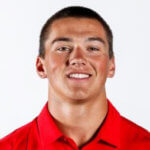 BISHOP QUICK HITS 20 career games, 15 starts.
BISHOP QUICK HITS 20 career games, 15 starts.
Averaging 5.7 tackles per game in his career, second-most of active Pac-12 secondary players.
2022: Appeared in 10 games with nine starts at safety.
Holds the team lead in tackles (60) while leading the secondary in TFL (6.0).
Also defended four passes (one INT, three PBU) and has 1.5 sacks.
Four games on the season with seven-plus stops, most recently at Washington State.
Posted a career-high 12 tackles (0.5 TFL) and a QB hurry during the season opener at Florida.
Eight more takedowns in the win over No. 7 USC.
First career interception and an 11-yard sack came at Arizona State.
2021: Played in 10 games on the season, starting the final six contests.
Pac-12 All-Conference Honorable Mention.
Led all true freshmen on the team with 54 tackles (9.0 TFL, 3.0 sacks) to go with five PBUs.
Recorded a career-high eight tackles twice (vs. Oregon, Pac-12 Championship; vs. Ohio State), also adding a fumble recovery in the Rose Bowl.
Blocked a 36-yard field goal, had seven tackles (1.0 TFL) and two pass breakups against No. 3 Oregon in the regular season.
Contributed four tackles in his collegiate debut vs. Weber State.
Produced five tackles (2.0 TFL) including a sack in his first start at Stanford.
Had a career-high 3.0 TFLs at Arizona, the most by a Utah true freshman since 2007.
High School: Three-star recruit by 247sports and Rivals out of Starr’s Mill HS.
First-team all-state as a junior, All-region and all-county as a sophomore.
Also earned County and Region MVP.
Invited to Blue-Grey All-American Bowl.
101 tackles, nine pass breakups and five interceptions his junior season, also recording five rushes for 145 yards and a touchdown as a senior.
Personal: Son of Richard and Vicki … has one brother, Jake … was born in Massachusetts.
